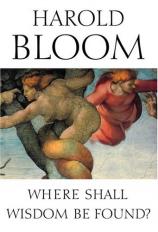Where Shall Wisdom Be Found?
Review
Where Shall Wisdom Be Found?
Harold Bloom is unquestionably one of this country's academic
literary heavyweights. He has taught at Yale for many years. The
listing of his books preceding the title page of this, his latest
production, runs to 28 items. His opinions are strongly held,
closely argued, often idiosyncratic, and never superficial. He
seems to have read, digested and remembered not only all the works
he is discussing, but also all the published critical comment on
them down through the years.
The subject of this book is what Bloom calls "wisdom writing," a
term that pretty well explains itself. The unspoken corollary, of
course --- one that Bloom never really acknowledges --- is that
each reader will have his own list of "wisdom" literature and that
no two lists will exactly agree. Bloom's list begins with Plato and
gets no closer to our own day than Proust and Joyce. The two major
Gods in his pantheon are Shakespeare for poetry and Cervantes for
the novel. Others who earn high marks from him include Sir Francis
Bacon, Montaigne and Samuel Johnson. There are some surprises on
his roster --- the anonymous authors of those parts of the Old
Testament known as the Kabbalah or Hebrew Bible, the apocryphal
Gospel of Thomas and Sigmund Freud, to name three. Americans who
earn places on his team include Emerson and, on a slightly lesser
level, Walt Whitman.
All of these authors and a number of others (Goethe, Saint
Augustine) are discussed in densely packed and allusive prose.
Bloom comes across as an academic writing mainly for his fellow
academics. He has, however, one gift that many of his fellow
academics lack --- he communicates well his own enthusiasm for the
works he is discussing. You may not agree with all of Bloom's
judgments and you may not understand what he is trying to tell you
in his knotted prose --- but you will know that these are books and
authors that matter deeply to him. If you go back to those you may
not know and reacquaint yourself with them, he will have achieved
his purpose.
The book often reads like a transcript of graduate-level college
lectures or perhaps the gist of a learned literary seminar. But
every so often Bloom sets off a colorful aphoristic skyrocket that
for a moment lights up not only his subject but also his own mind:
Sometimes, while reading THE ILIAD, he says, "you get the
impression that the gods are a storytelling convenience" who "live
on forever, perfectly cheerful as they contemplate our sufferings."
Nicely put.
Bloom's admiration for Shakespeare brings him back time and again
to two characters, Hamlet and Falstaff, who seem to him to most
perfectly embody Shakespeare's world and wisdom. Safe choices,
perhaps, but argued with uncommon gusto.
His characterization of Goethe centers on the man's "paganism." His
chapter on Proust wanders off into a dense literary thicket on the
subject of jealousy. There are indeed many spots in this book where
even the well-educated and careful reader will have to go back over
a sentence or a paragraph several times in order to puzzle out
exactly what Bloom has in mind. This book is not a beach read, nor
even a Saturday-afternoon-in-the-backyard-hammock item. Not
surprisingly, Bloom is full of disdain for the level of American
higher education, reserving for it the sarcastic nickname
"mediaversity," in which the first syllable obviously stands for
"mediocrity." It's safe to write that sort of thing when you are a
revered professor and critic with half a century of college
teaching on your resume.
Harold Bloom thinks great literature is important enough to discuss
seriously. He is right, of course. You may not find him easy
reading, but he will set you to thinking.
Reviewed by Robert Finn ([email protected]) on January 24, 2011
Where Shall Wisdom Be Found?
- Publication Date: October 7, 2004
- Genres: Literary Criticism, Nonfiction
- Hardcover: 304 pages
- Publisher: Riverhead Hardcover
- ISBN-10: 1573222844
- ISBN-13: 9781573222846









